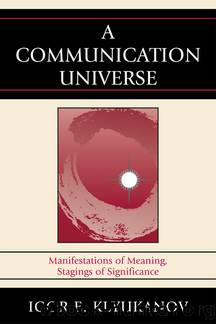A Communication Universe by Klyukanov Igor E.;

Author:Klyukanov, Igor E.;
Language: eng
Format: epub
Publisher: Lexington Books/Fortress Academic
Published: 2010-01-01T00:00:00+00:00
chapter six
v
Through the Fire:
Communication as Resignation
The (Un)Bearable Lightness of Being
It is common to equate the main difficulty of communication with misunderstanding or lack of understanding between its participants. This difficulty is mostly a part of the staging of communication as conversation. Without a doubt, misunderstanding or lack of understanding do not contribute to successful communication. A much more serious difficulty, however, is the situation when understanding is (or rather seems to be) achieved; now the subject can no longer wait for the Other (or the system) to clarify meaning or blame the Other (or the system) for not doing enough to clarify it. At this point, the subject must do something himself/herself so that communication can continue. In this light, communication can be conceptualized not so much as a process of understanding or constructing but rather creating meaning; a time comes for the subject to carry out/on the commitment made.
In other words, the subject situated in a temporal dimension is aware of the gravity and difficulty of his decisions, but at the same time he is aware that he must decide, that it is he who must decide, and that this process is linked to an indefinite series of necessary decision making that involves all other men. (Eco 1984, 113; emphasis mine)
The process of creating meaning is not the same as representation in the strict referential sense; rather, this process must be viewed the way M. Heidegger viewed representation. For him, âârepresentationâ (Vorstellung) means a process of bringing a thing before oneâs self, and thereby imagining it (the German word is the same) . . . by the word traditionally rendered in English as representation (Vorstellung) he means . . . a whole (metaphysical) process of reorganizing the world and producing a new category of beingâ (Jameson 2002, 46).
It was mentioned earlier that the staging of communication as construction was not complex enough because it was too grounded in reality lacking enough imagination. Now communication reveals its more complex nature; every act of communication can now be viewed as a complex number, combining real and imaginary parts. It becomes clear that the process of communication as creating meaning cannot be successful without a certain degree of imagination. To that end, the subject plays the role of a hyperreflexive observer (cf. Leydesdorff 2000), embracing the entire experience made meaningful up to that point. This way, what is brought before oneâs self is the entire process of communication: while communication was earlier conceptualized as a process of recognizing objects (cf. the staging of communication as invocation), or understanding the Other (cf. the staging of communication as conversation), or constructing together with the Other a world order (cf. the staging of communication as construction), now communication can be viewed as a process of the subject be(com)ing aware of (oneâs role in) communication, i.e., be(com)ing self-aware. That is why âproperly speaking . . . the Self exists only insofar as one is self-consciousâ (Aboulafia 1991, 231). As mentioned in the previous chapter, what is
Download
This site does not store any files on its server. We only index and link to content provided by other sites. Please contact the content providers to delete copyright contents if any and email us, we'll remove relevant links or contents immediately.
Whiskies (Collins Gem) by dominic roskrow(45173)
Spell It Out by David Crystal(36087)
Cecilia; Or, Memoirs of an Heiress — Volume 1 by Fanny Burney(32503)
Cecilia; Or, Memoirs of an Heiress — Volume 2 by Fanny Burney(31913)
Cecilia; Or, Memoirs of an Heiress — Volume 3 by Fanny Burney(31898)
Beautiful Disaster by McGuire Jamie(25287)
Trainspotting by Irvine Welsh(21573)
Chic & Unique Celebration Cakes by Zoe Clark(20011)
The Secret History by Donna Tartt(18951)
How High Can a Kangaroo Hop? by Jackie French(18784)
Twilight of the Idols With the Antichrist and Ecce Homo by Friedrich Nietzsche(18572)
All the Missing Girls by Megan Miranda(15787)
Cat's cradle by Kurt Vonnegut(15262)
Ready Player One by Cline Ernest(14586)
For the Love of Europe by Rick Steves(13628)
Fifty Shades Freed by E L James(13189)
4 3 2 1: A Novel by Paul Auster(12333)
Crooked Kingdom: Book 2 (Six of Crows) by Bardugo Leigh(12261)
Grundlagen Kreatives Schreiben (German Edition) by Helfferich Pia(10422)
